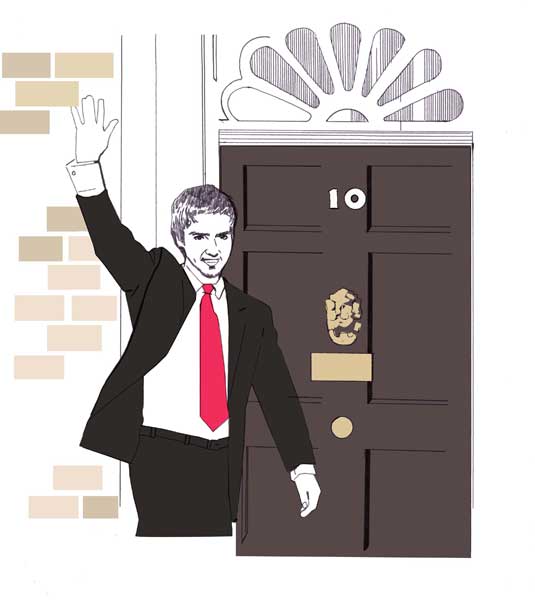2020 vision: Labour triumphs after the Cameron years with Britain's first black PM – and a familiar face...

If the decade began with David Cameron on the verge of historic victory, it ends, this month, in his humiliation and failure. The 53-year-old former prime minister has seen his bid to become head of the new global climate watchdog blocked by world leaders. Ten years ago this month, as nations were wrangling over climate change in Copenhagen, Mr Cameron was on the brink of becoming the youngest British prime minister in 200 years and bringing to an end 13 years of Labour government. But he surely didn't anticipate such a difficult eight years in office: in 2013, he led Britain into a dubious war with Iran, while British forces remained in Afghanistan until 2015, a full five years into his premiership, despite those promises that they would be out within two.
Mr Cameron disappointed those who thought he was committed to the environment: within two months of taking office, in 2010, he notoriously dropped the Conservative opposition to the third runway at Heathrow and during his premiership refused to invest in renewable energy.
Until last year, of course, the fortunes of the Labour party hardly fared better, with two election defeats. Now they are in office again, with Prime Minister Chuka Umunna (Britain's first black premier, in case you hadn't noticed) in Downing Street. And, once again, there is a young MP named Blair rising through the ranks of the Labour Party.
After Mr Cameron won the 2010 election with a majority of 70 – well short of a landslide – the Labour Party turned on itself with an old Brownite versus Blairite battle between Yvette Cooper and David Miliband for the leadership. Mr Miliband won, benefiting from the publication of Tony Blair's uncensored memoirs, which contained those memorably unflattering portrayals of Gordon Brown and his acolytes, including Ms Cooper.
Peter Mandelson stepped away from politics altogether, choosing to follow Mr Blair on to the speech-making circuit. Though let's not forget Lord Mandelson's most recent contribution to public life, winning I'm a Celebrity... Get Me Out of Here! in 2011. Mr Blair gave up his post as Middle East envoy the same year and launched his long-running chat show in the US in 2012. However, to the dismay and disbelief of many, Mr Blair was awarded the Nobel Peace Prize in 2013 for his work in the Middle East, although to this day it is not clear what he had achieved to deserve it.
Boris, now Lord, Johnson, secured his second term as London mayor in 2012, and continued to be trouble for Mr Cameron throughout the decade. In 2013, he led anti-EU rebels calling for Mr Cameron to overturn the Lisbon Treaty, destabilising the prime minister in the run-up to the 2014 General Election.
The war in Iran and the row over Europe dominated the election campaign, and the Tories came close to losing to Mr Miliband's Labour Party. Mr Cameron's first term was also dogged by rows over the economy: his chancellor, George Osborne, ordered deep cuts in spending on schools and hospitals, while the Tory right pressed for generous tax cuts that never came. Mr Cameron scraped through with a diminished majority of 24. Meanwhile, one MP elected in 2014 was a 30-year-old Euan Blair, the eldest son of the former prime minister.
Mr Miliband stood down as Labour leader the day after the election. His brother, Ed, the shadow foreign secretary, hoped to succeed him but he was beaten by the shadow schools secretary Mr Umunna, who only became an MP in 2010.
Lord Johnson's political ambitions continued to dominate British politics. In 2016, he decided not to run for a third term as mayor to concentrate on Westminster politics.
With the Cameron government struggling to get key laws through Parliament with its small majority, Mr Johnson began to position himself for the Tory leadership. He won the Tory safe seat of Kensington in the 2017 by-election and began openly challenging Mr Cameron's authority.
With his premiership severely weakened, Mr Cameron had little chance of winning last year's election. It proved a momentous night. Mr Umunna triumphed with a majority of 98 and, 10 years after the election of Barack Obama, Britain elected a black prime minister. Euan Blair was made a junior minister. The Tories, we now know, were also about to make history. Mr Cameron stood down as leader and, inevitably, Lord Johnson was a leading candidate to succeed him. But his disloyalty to the prime minister earned him many enemies and he was beaten by Nick Boles, the MP for Grantham who had been home secretary for three years. Mr Boles, an old rival of Mr Johnson and formerly Mr Cameron's right-hand man, became the first Tory leader to be in a civil partnership.
As the decade came to a close, and in an attempt to keep Lord Johnson quiet, the former mayor was elevated to the House of Lords by the new Tory leader.
Subscribe to Independent Premium to bookmark this article
Want to bookmark your favourite articles and stories to read or reference later? Start your Independent Premium subscription today.

Join our commenting forum
Join thought-provoking conversations, follow other Independent readers and see their replies